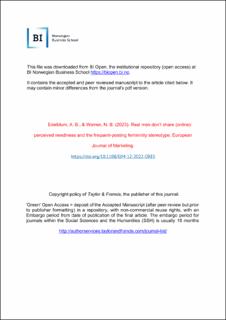Real men don’t share (online): perceived neediness and the frequent-posting femininity stereotype
Peer reviewed, Journal article
Submitted version

Åpne
Permanent lenke
https://hdl.handle.net/11250/3093707Utgivelsesdato
2023Metadata
Vis full innførselSamlinger
- Scientific articles [2181]
Sammendrag
Purpose Research emphasizes the motivations underlying and potential harmful consequences of social media use, but there is little understanding of stigmas faced by individual social media users, particularly as they pertain to gender. The purpose of this study is to examine a unique stereotype related to men’s social media use. Design/methodology/approach Four experiments examine judgments of men based on how often they post on social media (frequently vs infrequently). Findings The authors find that posting frequently (vs infrequently) affects the perceived gender of men but not women. This frequent-posting femininity stereotype is explained by perceived neediness and holds regardless of whether posts are about others (vs the self) or whether posts are shared by influencers (vs ordinary users). Research limitations/implications Future research should examine other stereotypes of social media users – including those pertaining to gender – and ways to mitigate such negative attributions. Researchers should examine how the frequent-posting femininity stereotype and other social media use stereotypes affect social media consumption and consumer well-being. Practical implications Managers should adjust consumer engagement strategies and restructure platforms to address the unique stigmas facing different consumer groups. Originality/value Providing insights into the dark side of social media, the authors investigate a unique domain – stereotypes about individual social media users. The findings of this study uncover an emasculating stigma against men who post often on social media, which may discourage men from online participation.
